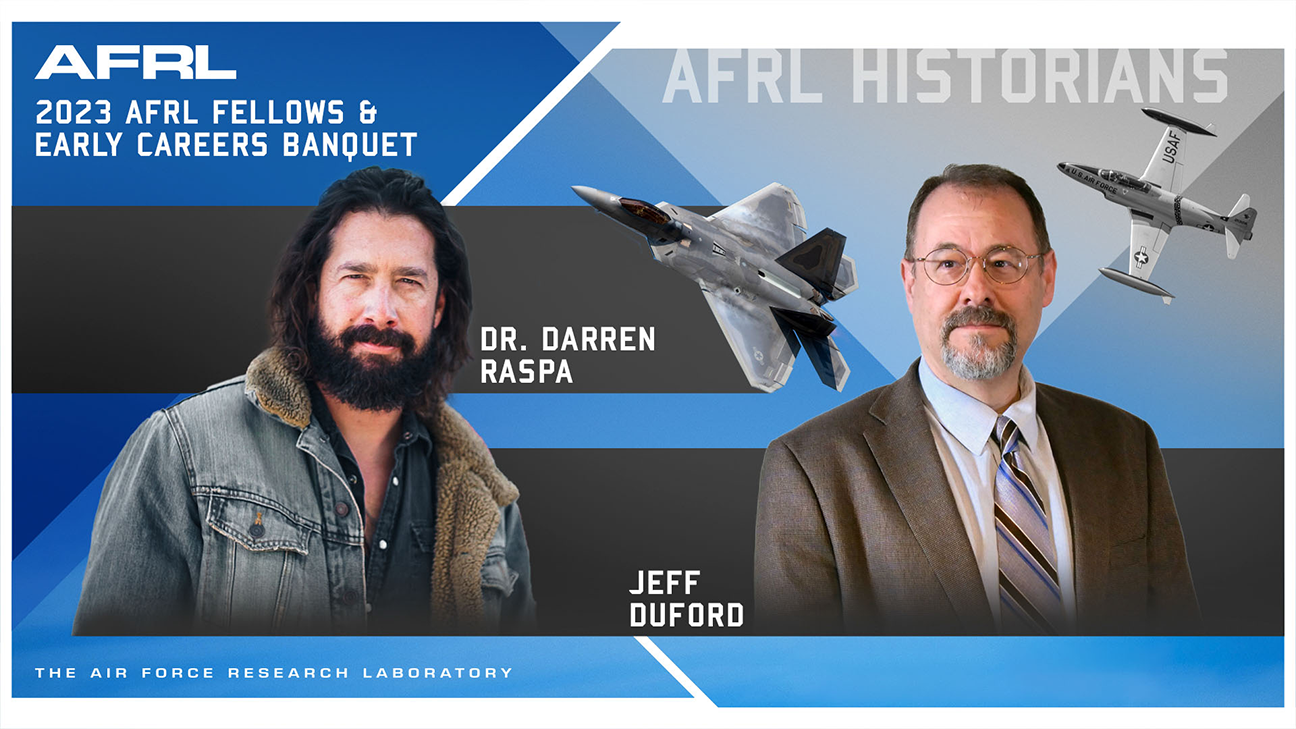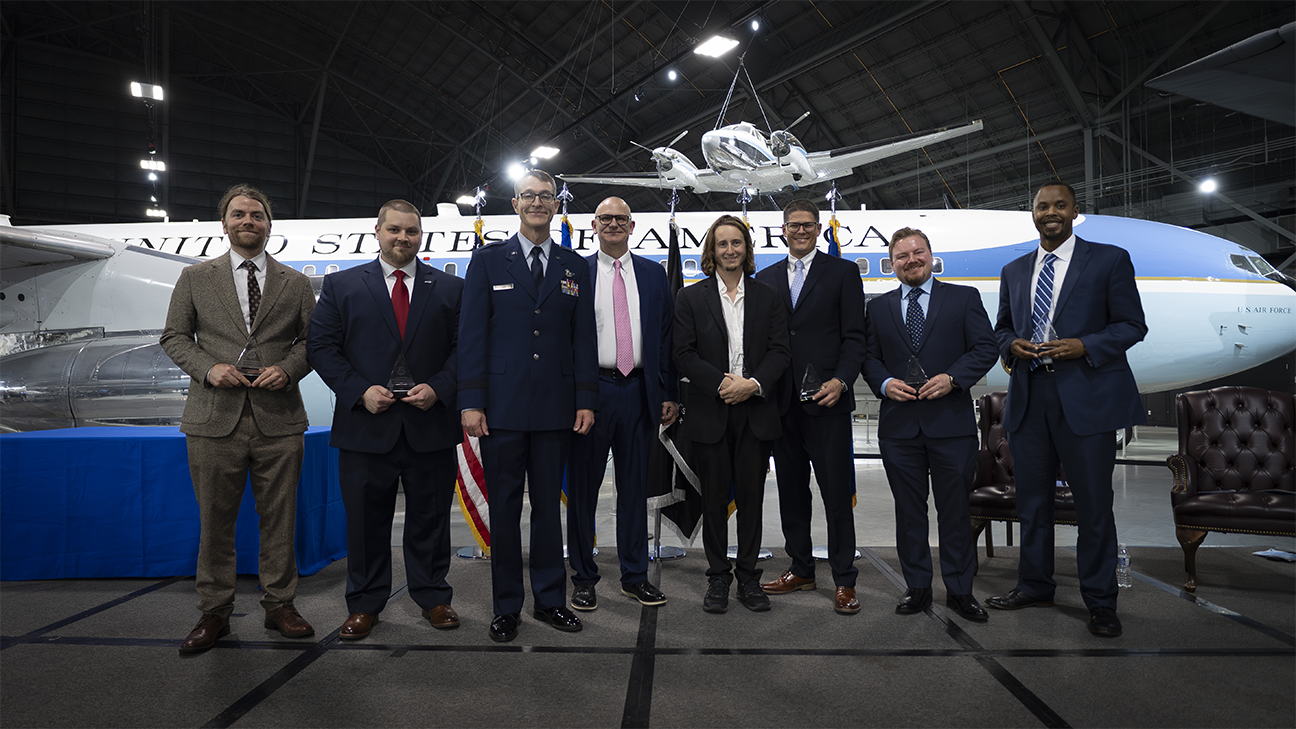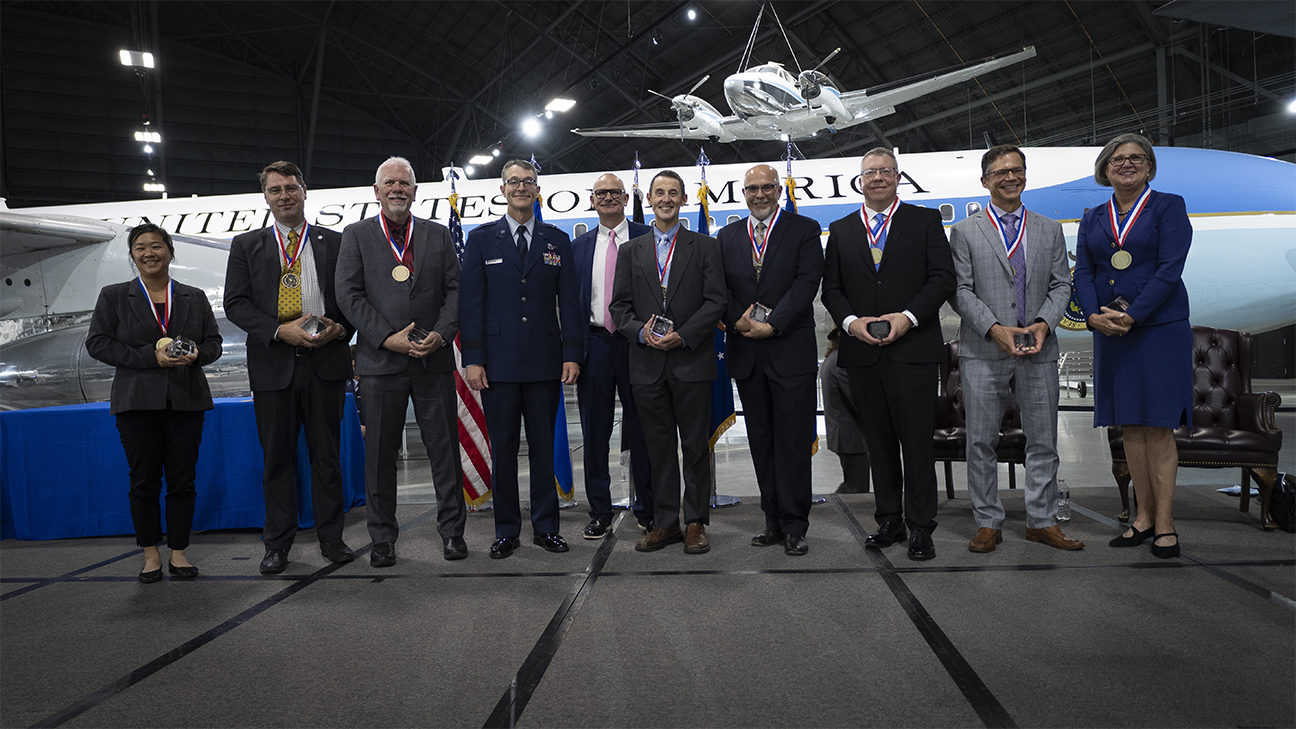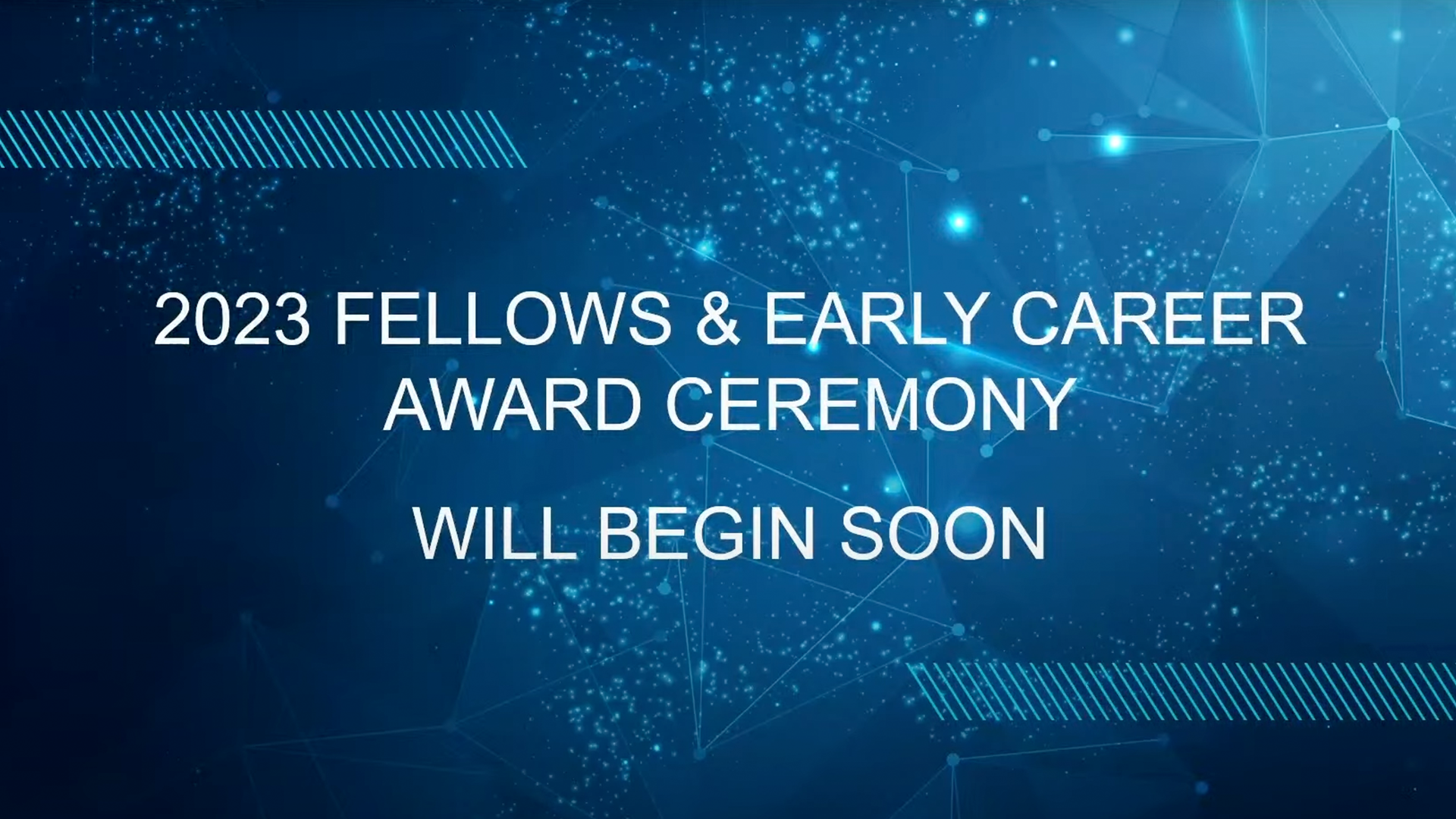AFRL scientists, engineers recognized for outstanding career accomplishments
WRIGHT-PATTERSON AIR FORCE BASE, Ohio (AFRL) – The Air Force Research Laboratory, or AFRL, honored 16 scientists and engineers Oct. 25, 2023, for outstanding career accomplishments at the 2023 Fellows and Science and Engineering Early Career Awards, or ECA, ceremony.

Air Force Research Laboratory historians Dr. Darren Raspa and Jeff Duford host the 2023 AFRL Fellows and Early Career Awards ceremony, Oct. 25, 2023, at the National Museum of the U.S. Air Force. This annual event honored scientists and engineers for outstanding career accomplishments. (U.S. Air Force graphic / Patrick Londergan)
This year’s ceremony honored seven ECA and nine AFRL Fellows recipients, as AFRL historians Jeff Duford and Dr. Darren Raspa hosted the event highlighting the honorees’ achievements and enduring value of their contributions to the STEM field.
“Today marks a truly historic moment as AFRL recognizes significant achievement and impact of several individuals and adds their names to a distinguished list,” Duford said.
Despite its domination of news headlines, the country is entering a phase of intense power competition, said Brig. Gen. Scott A. Cain, Air Force Research Laboratory commander. Both the department and the nation will require AFRL to move at an accelerated pace.
“This puts significant demand and pressure on our scientists and engineers to always be innovating, inventing, exploring and advancing the state of the art and science and technology [or S&T], so that we maintain our advantages in air and space,” Cain said. “The individuals that we recognize today, 16 scientists and engineers, exemplify that drive. They’re no doubt the absolute best of the best, but I’d also argue that they’re here because they understand the value of the team — they’ve demonstrated how to work together.”
Mastering science and technology demands persistent dedication and steadfast commitment to innovation, he added. At times, these fields require one to experience setbacks before rising again.
“We’re honoring individuals today who demonstrated that drive, and I’ll remind them or challenge them that they need to continue to bring that drive to AFRL and into our nation every day,” Cain said.

Seven Air Force Research Laboratory, or AFRL, Science and Engineering Early Career Awards, or ECA, awardees stand with Brig. Gen. Scott A. Cain, third from left, AFRL commander, and Dr. Timothy J. Bunning, fourth from left, AFRL chief technology officer, Oct. 25, 2023. The awardees were recognized for their outstanding career accomplishments during the 2023 Fellows and ECA ceremony. (U.S. Air Force photo / Keith Lewis)
Dr. Timothy J. Bunning, chief technology officer for Air Force Research Laboratory, said being part of this ceremony is the best part of his job.
“Truly it’s incredibly pleasing to be up here representing the scientists and engineers,” Bunning said.
As with previous years, each nomination package undergoes a rigorous review before the AFRL commander selects an honoree.
“As the chief technology officer, I lead the solicitation of nominees, and then a selection process for both pools,” Bunning said. “I can tell you that selection process is very rigorous, very thorough and very detailed — [using] very detailed rubrics. I would argue just to be nominated into either of the classes is an honor unto itself.”
Across the technical directorates and multidisciplinary work, Bunning added, the Fellows and ECAs play a pivotal role in this ecosystem.
“I’ve always said the No. 1 job of the lab is to grow thought leaders,” Bunning said. “I argue that we influence one of two ways. We influence with a checkbook, and a lot of people see AFRL with a $3 billion budget and they want to be part of that, but I believe influencing through thought leadership is the more important part of the lab. That is why we have a laboratory, that is why we grow science and technologists — we grow those practitioners.”
The ECA began in 2012 and requires recipients to make great strides in their S&T careers in a short period of time. ECA honorees must have spent less than seven years in government service and no more than 15 years since receiving a bachelor’s degree. Additionally, of the 5,000 subject matter experts in AFRL, Bunning said only 20 per year are nominated for ECA, of which only seven were honored this year.
“I believe growing high-quality scientists and engineers who will maintain technical integrity, [and] continue to lead the Department of the Air Force not only in areas that we’re good at right now, but particularly for the ECA, the vision toward where science and technology is going,” Bunning added.
While the ECA recognizes those making significant achievements early in their careers, the AFRL Fellows program recognizes outstanding scientists and engineers for exceptional AFRL career achievements including research, technology development, demonstrated tech transitions and organizational leadership.
Fellows who are selected are part of an elite group representing .3% of the AFRL professional technical staff with only 251 AFRL recipients since the program began 37 years ago, Cain said. Each new AFRL fellow receives a research grant along with a medallion and a photo display at AFRL headquarters.

Seven Air Force Research Laboratory, or AFRL, Fellows stand with Brig. Gen. Scott A. Cain, fourth from left, AFRL commander, and Dr. Timothy J. Bunning, fifth from left, AFRL chief technology officer, Oct. 25, 2023. The honorees were recognized for their outstanding career accomplishments during the 2023 Fellows and ECA ceremony. Note: Dr. Stephen M. White is not pictured. (U.S. Air Force photo / Keith Lewis)
“Our fellows had been tackling science and engineering challenges for many years and I talked about provoke, persist and prevail before, but these individuals are the epitome of persist prevail,” Cain said. “Not only does this award represent a culmination of a career of excellence and accomplishment, but it also signifies that you are among our most relied upon and trusted technical leaders, and in your careers, the tech space and the nature of tech competition has changed quite dramatically.”
Given all that the scientists, engineers and technologists must accomplish to be nominated, Bunning said it is more difficult to become an AFRL fellow than many other professional technical societies.
“It really gives you a sense of the bar … of the talent that we have coming in,” Bunning added.
Both leaders conveyed anticipation for collaborating with the new awardees.
“Congratulations … this is our chance to celebrate you and you should take a moment just to be proud of what you have accomplished,” Cain said. “We’re all proud and thankful for all of you.”
The Early Career Award winners include:
- Dr. Nathan R. Bridges
- Dr. Todd M. Butler
- Dr. Nicholas C. Miller
- Dr. Kenneth S. Obenberger
- Dr. Michael R. Page
- Dr. James A. Schrock
- Dr. Preston T. Webster
The 2023 AFRL fellows include:
- Dr. Mark Benedict
- Thomas Dalrymple
- Dr. Richard “Scott” Erwin
- Dr. Grace Metcalfe
- Dr. Dennis Montera
- Dr. Michael Uchic
- Dr. Eric Welle
- Dr. Stephen White
- Dr. Stacie E. Williams
About AFRL
The Air Force Research Laboratory, or AFRL, is the primary scientific research and development center for the Department of the Air Force. AFRL plays an integral role in leading the discovery, development and integration of affordable warfighting technologies for our air, space and cyberspace force. With a workforce of more than 12,500 across nine technology areas and 40 other operations across the globe, AFRL provides a diverse portfolio of science and technology ranging from fundamental to advanced research and technology development. For more information, visit www.afresearchlab.com.


